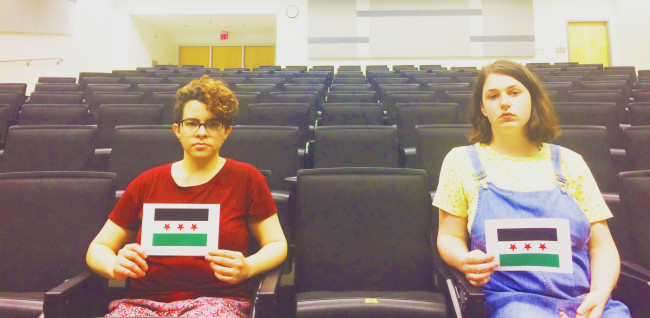Sunday, April 16, students gathered on the Sunken Garden for the Rise for Refugees Vigil, ending a week of events designed to encourage College of William and Mary students to support “saving a seat” for students displaced by conflict in Syria. This week was in support of Books Not Bombs, a growing campaign at the College.
In an event advertised as a vigil, students gathered to demonstrate what saving a seat would actually look like.
Nairuti Shastry ’17, the founder of the College’s Books Not Bombs campaign, got her inspiration for the initiative while studying abroad in Belgium. There, she worked with primarily disadvantaged, Middle Eastern populations, many of whom were refugees. After a terrorist attack in Belgium, she said that many of the people she was working with changed how they treated the disadvantaged populations, which upset her because she was working with an organization that highlighted values such as diversity and inclusion.
When she returned to the College, Shastry, who is an immigrant herself, decided to start an initiative that focused on refugee populations, particularly one that would lower institutional and financial barriers that refugees face.
“We did a lot of research, and we stumbled upon Books Not Bombs,” Shastry said. “It has a lot of university affiliates across the country, including big names like the University of Virginia, Dartmouth and Columbia. I didn’t see William and Mary though. We wanted to bring this campaign to our campus since we have such a strong international focus, and we work with lots of organizations that are committed to social justice.”
According to Shastry, 11 million people have been displaced because of conflict in Syria. The United Nations considers 4.5 million of these people to be refugees. Within the United States, there are 12,000 college-aged Syrian refugees and 2,500 college-aged students unable to pursue higher education due to financial barriers.
Books Not Bombs is a student-led campaign that goes along with the Institute for International Education and the Syria Consortium, which was founded in 2012. The Institute for International Education is made up of 75 universities and advocates for students seeking admission at colleges and universities.
If the College were to join the Institute of International Education, it would “save seats” for Syrian refugees in the undergraduate and graduate admissions process. According to Shastry, this would lessen educational barriers for those students displaced by the conflict.
This is to make sure we are living up to our values of a strong, liberal arts institution with a strong international focus,” Shastry said.
“This is to make sure we are living up to our values of a strong, liberal arts institution with a strong international focus,” Shastry said. “We need to be true to our community of Tribe Pride.”
March 14, Shastry presented her campaign to the Student Assembly Senate to rally support for the Books Not Bombs Resolution, which was passed by a vote of unanimous consent. This resolution codified SA support for the initiative and was sponsored by Class of 2020 President Kelsey Vita ’20.
Vita said that she believes it is SA’s duty to send a message that the College is in support of all students, including international students and refugees.
I strongly believe it is our duty as a representative body to send a loud, clear message that William and Mary is a place where every student that works hard and wants to pursue a higher education will have the opportunity to succeed,” Vita said.
“I strongly believe it is our duty as a representative body to send a loud, clear message that William and Mary is a place where every student that works hard and wants to pursue a higher education will have the opportunity to succeed,” Vita said. “This resolution addresses an issue that is concerning not only to activist student groups on campus, but also the world as a whole, and furthers our mission as a college to ‘instill in its students an appreciation for the human condition, a concern for the public well-being and a lifelong commitment to learning.’”
Shastry said she worked with Associate Dean of Admission and Director of Global Recruitment Deborah Basket to figure out details of admission and finances. Shastry said that Basket emphasized that if the College joined the Consortium, it would not create a quota system for admissions. Most likely, Shastry said, the College would set aside money for refugees, and if qualifying students were accepted, they would receive money to attend.
“A lot of other universities have joined the Consortium,” Shastry said. “I would imagine we would have to talk to the Board of Visitors and assume that there would be some tuition assistance through the financial aid department, but I do see a lot of private scholarships being sponsored by the BOV or student organizations on campus to cover other associated costs of attending of college.”
This past week, Books Not Bombs partnered with the College’s chapter of Amnesty International for their “Rise for Refugees” week. Books Not Bombs held their own events at the end, including a documentary screening of “White Helmets,” a roundtable discussion of students and professors and the vigil for Syrians on Sunday night. Shiyam Galyon, one of Books Not Bombs’ national coordinators, also attended the vigil.
If the College were to join the Institute for International Education, administrators would fill out an application on the Institute’s website. Each university explains its admissions requirements and what they’re looking for in students. Then, the Institute guides each university through the process.
“I just want to emphasize that this is not associated with the quota system,” Shastry said. “This is not reserving a certain number of seats. If you don’t meet the requirements, you’re not accepted. This is to reduce the logistical barriers. It’s saving a seat in the metaphorical.”

